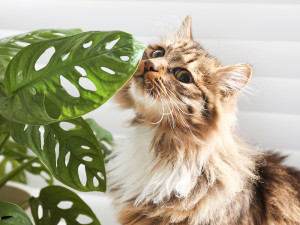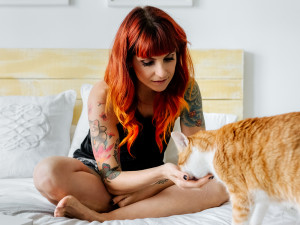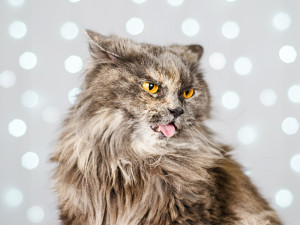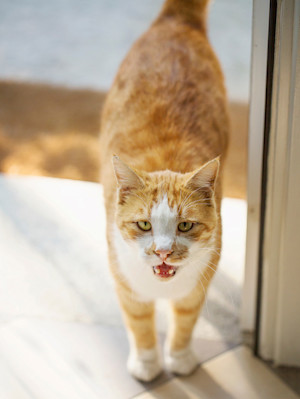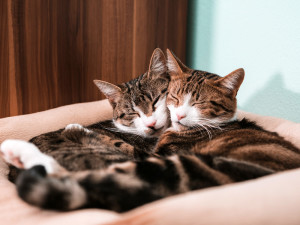Why Essential Oils and Cats Don’t Mix
How to keep your DIY spa cat-friendly
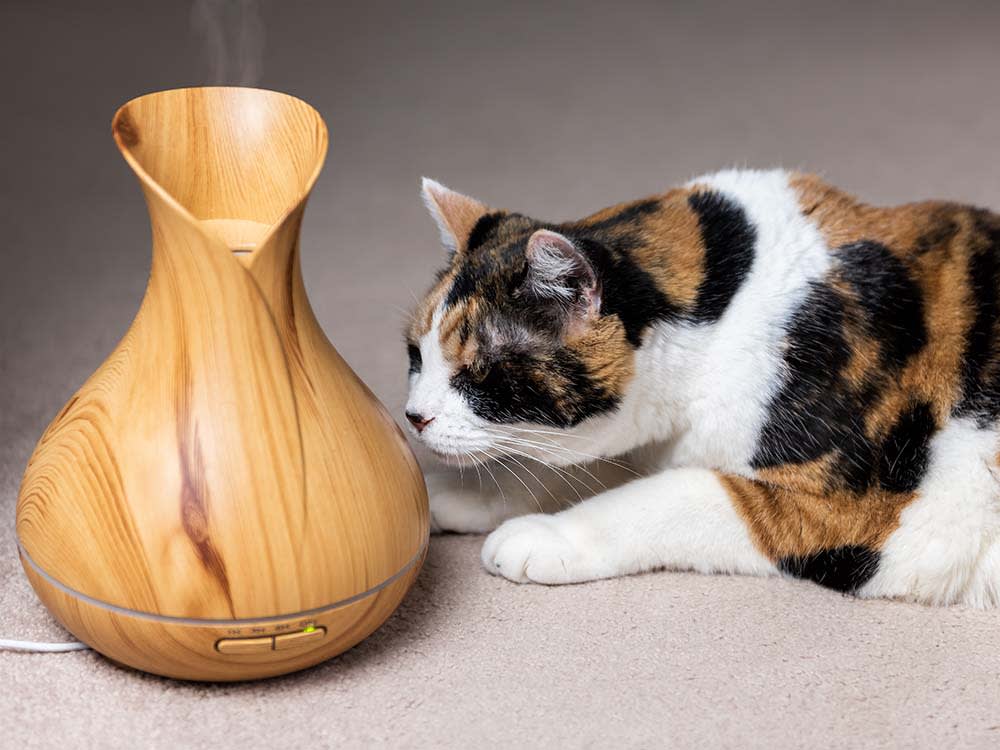
Share Article
There’s something to be said for an essential oil diffuser. The spa-like moment of water vapour and eucalyptus washing over you, briefly re-centring your frazzled nerves even if you haven’t moved from your sofa. Unfortunately, while essential oils are lovely for humans, it turns out they’re a lot less pleasant for animals – and you should probably stop using them at all around your cat.
For people, essential oils are just associated with pleasant smells (and dubious medical claims), but some oils can cause major problems with pets, especially cats. Cats lack an important enzyme in their liveropens in a new tab, which makes it difficult for them to metabolise certain substances, such as essential oils, which can cause vomitingopens in a new tab, trouble breathing and liver failure. According to the Pet Poison Hotlineopens in a new tab, the more concentrated the oil, the more dangerous it can be.

littleKin™ is Kinship’s home just for puppy and kitten parents. Bop over to check out expert advice, new pet tools, and special deals—all curated for your newest family member.
opens in a new tabWhich essential oils are dangerous to cats?
The oils that the Pet Poison Hotline cites as hazardous to catsopens in a new tab are:
cinnamon
citrus (d-limonene)
clove
eucalyptus
pennyroyal
peppermint
pine
sweet birch
tea tree
wintergreen
ylang ylang
If you are a multi-pet household, the Pet Poison Helplineopens in a new tab have shorter lists of dangerous or simply ‘bad’ substances for dogs:
pennyroyal
pine
tea tree
wintergreen
cinnamon
citrus
peppermint
sweet birch
ylang ylang
Active vs passive diffusers
Part of the reason for the danger that lies in the different types of diffusers and the rise of ‘active diffusers’ – the plug-in ones that spritz nice smelling mist. Nebulisingopens in a new tab and ultrasonicopens in a new tab diffusers send tiny droplets of both water and oil into the air – which smell really nice to us but can land on a cat’s fur, where they can absorb it through their skin or ingest it while grooming.
The older type of diffuser – the so-called ‘passive diffuser’ such as reed diffusers or heated plug-ins – still cause some worry, as the danger to cats can come via either inhalation or ingestion. Watch for signs of troubled breathing (pantingopens in a new tab, wheezing, etc), watering eyes or nose or vomitingopens in a new tab, and get your pet to fresh air if any of these happen (and to a vet if they don’t get better quickly). Even if your cat isn’t showing any issues with breathing, watch out for them getting too close to a diffuser and deciding to chew on the ends of the reeds – there’s a famous quote about curiosity and cats for a reason.
With active diffusers, the oil can still be breathed in, ingested through grooming, or absorbed through the skin. The exact symptoms can vary by type of oil and amount ingested but include dribblingopens in a new tab, vomiting, tremors, wobbliness (ataxia), trouble breathing, low heart rate and even liver failure. Small cats, kittens and those with pre-existing conditions can be more at risk than others. These are severe, and even potentially life threatening, conditions.
Don’t use essential oils for parasite control
If you’re researching how to manage ticks and fleas for your pets, it’s not rare to find people recommending essential oils, often some of the ones we’ve mentioned above – notably eucalyptus, mint, tea tree and citrus. While there may be some preliminary scientific research pointing to those compounds as potentially effective at repelling some insects, those studies are almost always lab tests for overall efficacy and not done in conjunction with safety testing for the pets they’d be applied to.
Sometimes you’ll find that these lists are specifically aimed at dog owners recommending oils that are less dangerous for them. Even so, be careful – and if you own both cats and dogs, don’t use those oils, as your cat might decide that it’s time to groom your Husky and get a mouthful of something deadly.
Always consult your vet when you’re looking to treat a pet health problem like ticks and fleas, as they’ll have a better idea of what’s appropriate for your pet, budget and situation. All of the main pest control medications have to go through extensive testing and certification before they hit the market.
What can I use in place of a diffuser?
Passive diffusers are, on the whole, significantly safer than active ones. They may not give you a lovely face full of mist in your home office, but they’re much less likely to cause problems with your pets, especially if you stick to oils that are nowhere on the danger list (and keep the diffusers well out of the reach of curious animals).
The same rules apply to scented candles. Always keep an eye on your cats and make sure they’re not showing any adverse reactions. There are some candles designed specifically to be pet friendlyopens in a new tab, but we haven’t tried them, so we can’t speak to how they actually smell.
My personal suggestion? Bake some biscuits. Because then your house smells amazing, your cat stays safe, and you get to have biscuits.

Tim Barribeau
Tim Barribeau is a freelance writer, editor, cat dad, and “help your boyfriend buy a suit that actually fits for once” consultant. He was previously the Style and Pets editor at Wirecutter, and has bylines at a bunch of publications that don't exist anymore (and a couple that still do).
Related articles
![Young modern woman with tattoos and orange hair sitting cross-legged on her bed with her cat]() opens in a new tab
opens in a new tabDoes My Cat Really Need to See a Vet?
Cats can be hard to read. Especially when they’re sick. Or… not sick? We asked a veterinarian how to tell
![grey and white cat with tongue sticking out]() opens in a new tab
opens in a new tabWhy Is Your Cat Vomiting Like They Partied All Night?
Here’s when you should worry if your cat is throwing up
![Gray and white striped cat is scratching his ear]() opens in a new tab
opens in a new tabWhat’s Up With My Cat’s Skin?
Everything you need to know about cat allergies, according to three veterinary dermatologists
![Cat playing in spider plant.]() opens in a new tab
opens in a new tabAre Spider Plants Toxic to Cats?
Learn what you should do if your ‘spider babies’ and cat baby interact
![Red Cat On Threshold Looks At The Camera And Meows.]() opens in a new tab
opens in a new tabWhy Is My Cat Heavy Breathing?
This can happen over time or very suddenly. Either way, it’s important to learn more about this symptom
![Siamese cat coughing]() opens in a new tab
opens in a new tabWhy Is Your Cat Coughing?
You thought it was a hairball, but nothing’s coming up
![Two tabby cats in embrace lying in cushion.]() opens in a new tab
opens in a new tabWhat Are Cat Pheromones and How Do They Work?
Communication is key, and pheromones are your cat’s version of DMs
